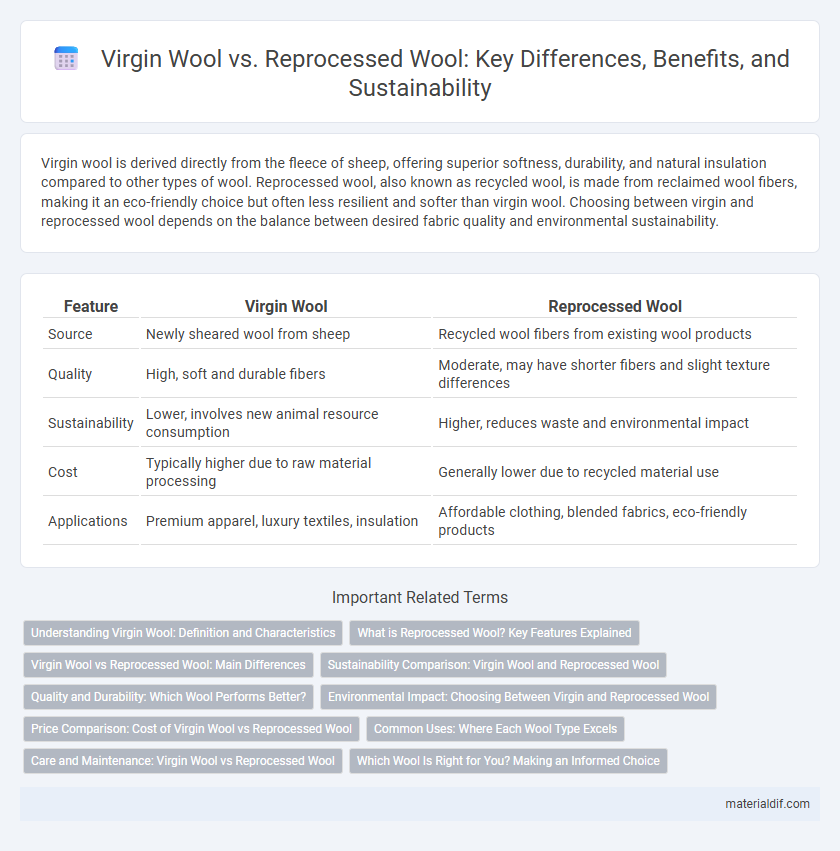Virgin wool is derived directly from the fleece of sheep, offering superior softness, durability, and natural insulation compared to other types of wool. Reprocessed wool, also known as recycled wool, is made from reclaimed wool fibers, making it an eco-friendly choice but often less resilient and softer than virgin wool. Choosing between virgin and reprocessed wool depends on the balance between desired fabric quality and environmental sustainability.
Table of Comparison
| Feature | Virgin Wool | Reprocessed Wool |
|---|---|---|
| Source | Newly sheared wool from sheep | Recycled wool fibers from existing wool products |
| Quality | High, soft and durable fibers | Moderate, may have shorter fibers and slight texture differences |
| Sustainability | Lower, involves new animal resource consumption | Higher, reduces waste and environmental impact |
| Cost | Typically higher due to raw material processing | Generally lower due to recycled material use |
| Applications | Premium apparel, luxury textiles, insulation | Affordable clothing, blended fabrics, eco-friendly products |
Understanding Virgin Wool: Definition and Characteristics
Virgin wool refers to wool fibers that are sheared directly from a sheep and have never been processed or used before, ensuring high purity and strength. It is characterized by its softness, elasticity, and durability, making it ideal for premium textiles and garments. Unlike reprocessed wool, virgin wool maintains consistent fiber length and quality, enhancing its insulating properties and resistance to wear.
What is Reprocessed Wool? Key Features Explained
Reprocessed wool is made by recycling used wool garments and textile waste, breaking them down into fibers to create new yarns without compromising quality. Key features include sustainability through reduced waste, preservation of wool's natural insulation and moisture-wicking properties, and cost-effectiveness compared to virgin wool. This eco-friendly alternative supports circular fashion by minimizing resource consumption and environmental impact.
Virgin Wool vs Reprocessed Wool: Main Differences
Virgin wool is sourced directly from the first shearing of sheep, offering superior softness, strength, and durability compared to reprocessed wool. Reprocessed wool, also known as recycled wool, is made from reclaimed wool fibers extracted from old garments or fabric scraps, which may result in shorter fibers and slightly lower fabric quality. The primary differences lie in fiber length, fabric resilience, environmental impact, and cost, with virgin wool being more premium and reprocessed wool promoting sustainability through waste reduction.
Sustainability Comparison: Virgin Wool and Reprocessed Wool
Virgin wool, sourced directly from sheep, offers high durability and natural breathability but requires significant land, water, and energy resources, impacting environmental sustainability. Reprocessed wool, made from reclaimed wool fibers, reduces waste and lowers carbon emissions by minimizing the need for raw material extraction, contributing to circular fashion and sustainable textile production. Choosing reprocessed wool supports resource efficiency and waste reduction, making it a more eco-friendly option compared to virgin wool.
Quality and Durability: Which Wool Performs Better?
Virgin wool, sourced directly from sheep fleece, boasts superior fiber strength and resilience, ensuring higher quality and longer durability compared to reprocessed wool. Reprocessed wool, made from recycled fibers, tends to have shorter staple lengths and reduced tensile strength, which can compromise its durability and overall performance. High-grade virgin wool offers enhanced elasticity, moisture-wicking properties, and natural crimp, resulting in garments with better shape retention and wear resistance.
Environmental Impact: Choosing Between Virgin and Reprocessed Wool
Virgin wool production requires significant water and energy resources, often leading to higher carbon emissions compared to reprocessed wool. Reprocessed wool reduces waste by recycling existing fibers, thereby minimizing landfill impact and lowering overall environmental footprint. Choosing reprocessed wool supports sustainable textile practices and conserves natural resources.
Price Comparison: Cost of Virgin Wool vs Reprocessed Wool
Virgin wool is generally priced higher due to its superior fiber quality, durability, and the extensive processing required from raw sheep fleece. Reprocessed wool, made from recycled fibers, offers a more cost-effective alternative with lower production expenses, making it appealing for budget-conscious consumers and sustainable fashion brands. The price gap between the two types depends on factors such as fiber grade, processing technology, and market demand for eco-friendly materials.
Common Uses: Where Each Wool Type Excels
Virgin wool, sourced from first shearing of sheep, excels in high-end fashion and luxury garments due to its superior softness and durability. Reprocessed wool, made from recycled textile fibers, is ideal for affordable insulation, upholstery, and eco-friendly product lines, offering sustainability without compromising warmth. Both types serve distinct markets, with virgin wool favored in premium tailoring and reprocessed wool thriving in environmentally conscious manufacturing.
Care and Maintenance: Virgin Wool vs Reprocessed Wool
Virgin wool requires gentle hand washing or dry cleaning to maintain its natural fibers and elasticity, preserving softness and durability. Reprocessed wool, often mixed with synthetic fibers, demands careful temperature control during washing to prevent shrinking and fiber damage. Both types benefit from air drying and avoiding excessive agitation to extend garment lifespan and appearance.
Which Wool Is Right for You? Making an Informed Choice
Choosing between virgin wool and reprocessed wool depends on your priorities for quality and sustainability. Virgin wool offers superior softness, durability, and insulation due to its long, unbroken fibers, making it ideal for premium garments and cold climates. Reprocessed wool, made from reclaimed fibers, provides an eco-friendly, cost-effective option suitable for everyday wear and reducing textile waste without significantly compromising warmth or comfort.
Virgin Wool vs Reprocessed Wool Infographic

 materialdif.com
materialdif.com